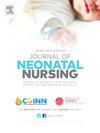Mothers' perspectives on lactation support in the neonatal intensive care unit at ST. Joseph's hospital, Ghana
Q2 Nursing
引用次数: 0
Abstract
Introduction
Breastfeeding is crucial for the survival and development of preterm infants, as it provides essential nutrients and immune protection. Despite their significance, various factors influence mothers' abilities to initiate and sustain breastfeeding. This study aimed to explore lactation support available to mothers with preterm babies in the Neonatal Intensive Care Unit of St. Joseph's Hospital. Ghana.
Methods
A qualitative approach using an exploratory descriptive design was used to investigate lactation support for mothers with preterm babies. Purposive sampling was used to recruit fifteen participants. The data were analyzed using thematic analysis.
Findings
This study found that both individual factors, such as personal beliefs, perceptions, self-efficacy, and motivation, and interpersonal factors, including support and encouragement from family members, friends, and healthcare providers, shape mothers’ breastfeeding of preterm infants.
Conclusion
This study emphasizes the need for stronger lactation support to improve preterm breastfeeding, highlighting personal beliefs and healthcare support in addressing issues hindering effective breastfeeding.
加纳圣约瑟夫医院新生儿重症监护病房中母亲对哺乳支持的看法
母乳喂养对早产儿的生存和发育至关重要,因为它提供了必需的营养和免疫保护。尽管具有重要意义,但各种因素影响母亲开始和维持母乳喂养的能力。本研究旨在探讨圣约瑟夫医院新生儿重症监护病房早产儿母亲的哺乳支持。加纳。方法采用探索性描述设计的定性方法对早产儿母亲的哺乳支持进行调查。采用有目的抽样方法,共招募15名参与者。采用专题分析法对数据进行分析。本研究发现,个体因素,如个人信仰、认知、自我效能和动机,以及人际因素,包括来自家庭成员、朋友和医疗保健提供者的支持和鼓励,都会影响母亲对早产儿的母乳喂养。结论本研究强调需要加强哺乳支持来改善早产儿母乳喂养,强调个人信仰和保健支持在解决阻碍有效母乳喂养的问题方面的作用。
本文章由计算机程序翻译,如有差异,请以英文原文为准。
求助全文
约1分钟内获得全文
求助全文
来源期刊

Journal of Neonatal Nursing
Nursing-Pediatrics
CiteScore
2.00
自引率
0.00%
发文量
143
期刊介绍:
Aims & Scope: This is the practical, bimonthly, research-based journal for all professionals concerned with the care of neonates and their families, both in hospital and the community. It aims to support the development of the essential practice, management, education and health promotion skills required by these professionals. The JNN will provide a forum for the exchange of ideas and information between the range of professionals working in this field; promote cooperation between these professionals; facilitate partnership care with families; provide information and informed opinion; promote innovation and change in the care of neonates and their families; and provide an education resource for this important rapidly developing field.
 求助内容:
求助内容: 应助结果提醒方式:
应助结果提醒方式:


